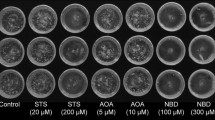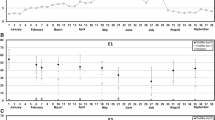Abstract
Doubled haploid (DH) production is a key technology in plant breeding and research. One emerging method of choice for DH production is microspore culture, which requires reprogramming of the microspores from their normal gametophytic development to a sporophytic development resulting in embryo formation. This commonly requires the application of stress such as cold, heat, or starvation. Here, we report the effect of different stress treatments on embryo formation and the proportion of green plants in triticale microspore culture. We observed different responses to the applied stress treatments among three studied genotypes. In general, a 3-wk cold stress treatment performed best with regard to the two criteria. For one genotype, the application of a 24- or 48-h heat stress gave similar or slightly better results and consequently may be an alternative for genotypes that are recalcitrant to the cold stress treatment.


Similar content being viewed by others
References
Castillo AM, Cistué L, Vallés MP, Soriano M (2009) Chromosome doubling in monocots. In: Touraev A, Forster BP, Jain SM (eds) Advances in haploid production in higher plants. Springer, Heidelberg, pp 329–338
Devaux P, Kasha KJ (2009) Overview of barley doubled haploid production. In: Touraev A, Forster BP, Jain SM (eds) Advances in haploid production in higher plants. Springer, Heidelberg, pp 47–63
Eudes F, Amundsen E (2005) Isolated microspore culture of Canadian 6x triticale cultivars. Plant Cell Tissue Organ Cult 82:233–241
Eudes F, Chugh A (2009) An overview of triticale doubled haploids. In: Touraev A, Forster BP, Mohan Jain S (eds) Advances in haploid production in higher plants. Springer, Heidelberg, pp 87–96
Forster BP, Heberle-Bors E, Kasha KJ, Touraev A (2007) The resurgence of haploids in higher plants. Trends Plant Sci 12:368–375
Gustafson V, Baenziger PS, Wright MS, Stroup WW, Yen Y (1995) Isolated wheat microspore culture. Plant Cell Tissue Organ Cult 42:207–213
Hansen NJP, Andersen SB (1998) In vitro chromosome doubling with colchicine during microspore culture in wheat (Triticum aestivum L.). Euphytica 102:101–108
Herrmann RG, Feierabend J (1980) The presence of DNA in ribosome-deficient plastids of heat-bleached rye leaves. Eur J Biochem 104:603–609
Hess WR, Blank-Huber M, Fieder B, Börner T, Rüdiger W (1992) Chlorophyll synthetase and chloroplast tRNAglu are present in heat-bleached, ribosome-deficient plastids. J Plant Physiol 139:427–430
Immonen S, Robinson J (2000) Stress treatments and ficoll for improving green plant regeneration in triticale anther culture. Plant Sci 150:77–84
Oleszczuk S, Sowa S, Zimny J (2004) Direct embryogenesis and green plant regeneration from isolated microspores of hexaploid triticale (x Triticosecale Wittmack) cv. Bogo. Plant Cell Rep 22:885–893
Shariatpanahi ME, Bal U, Heberle-Bors E, Touraev A (2006) Stresses applied for the re-programming of plant microspores towards in vitro embryogenesis. Physiol Plant 127:519–534
The R Core Team (2013) R: a language and environment for statistical computing. R Foundation for Statistical Computing. http://www.R-project.org. Version 3.0.1. Accessed 16 Apr 2013
Touraev A, Ilham A, Vicente O, Heberle-Bors E (1996a) Stress-induced microspore embryogenesis in tobacco: an optimized system for molecular studies. Plant Cell Rep 15:561–565
Touraev A, Indrianto A, Wratschko I, Vicente O, Heberle-Bors E (1996b) Efficient microspore embryogenesis in wheat (Triticum aestivum L.) induced by starvation at high temperatures. Sex Plant Reprod 9:209–215
Wędzony M, Forster BP, Żur I, Golemiec E, Szechyńska-Hebda M, Dubas E, Gotębiowska G (2009) Progress in doubled haploid technology in higher plants. In: Touraev A, Forster BP, Jain SM (eds) Advances in haploid production in higher plants. Springer, Heidelberg, pp 1–33
Würschum T (2012) Mapping QTL for agronomic traits in breeding populations. Theor Appl Genet 125:201–210
Würschum T, Tucker MR, Reif JC, Maurer HP (2012) Improved efficiency of doubled haploid generation in hexaploid triticale by in vitro chromosome doubling. BMC Plant Biol 12:109
Zheng MY, Liu W, Weng Y, Polle E, Konzak CF (2001) Culture of freshly isolated wheat (Triticum aestivum L.) microspores treated with inducer chemicals. Plant Cell Rep 20:685–690
Acknowledgments
We greatly acknowledge the lab work of Alexandra Appel, Sylvia Kaiser, Barbara Renz, and Angela Harmsen. We greatly appreciate the helpful comments and suggestions of two anonymous reviewers.
Author information
Authors and Affiliations
Corresponding author
Additional information
Editor: J. Forster
Rights and permissions
About this article
Cite this article
Würschum, T., Tucker, M.R. & Maurer, H.P. Stress treatments influence efficiency of microspore embryogenesis and green plant regeneration in hexaploid triticale (× Triticosecale Wittmack L.). In Vitro Cell.Dev.Biol.-Plant 50, 143–148 (2014). https://doi.org/10.1007/s11627-013-9539-3
Received:
Accepted:
Published:
Issue Date:
DOI: https://doi.org/10.1007/s11627-013-9539-3




